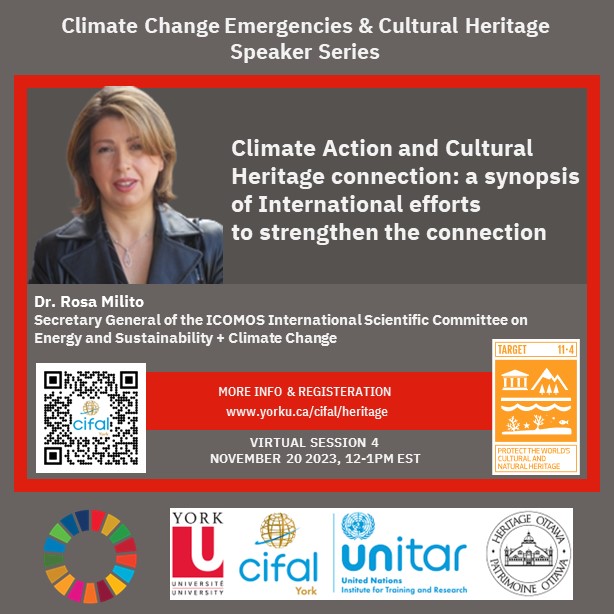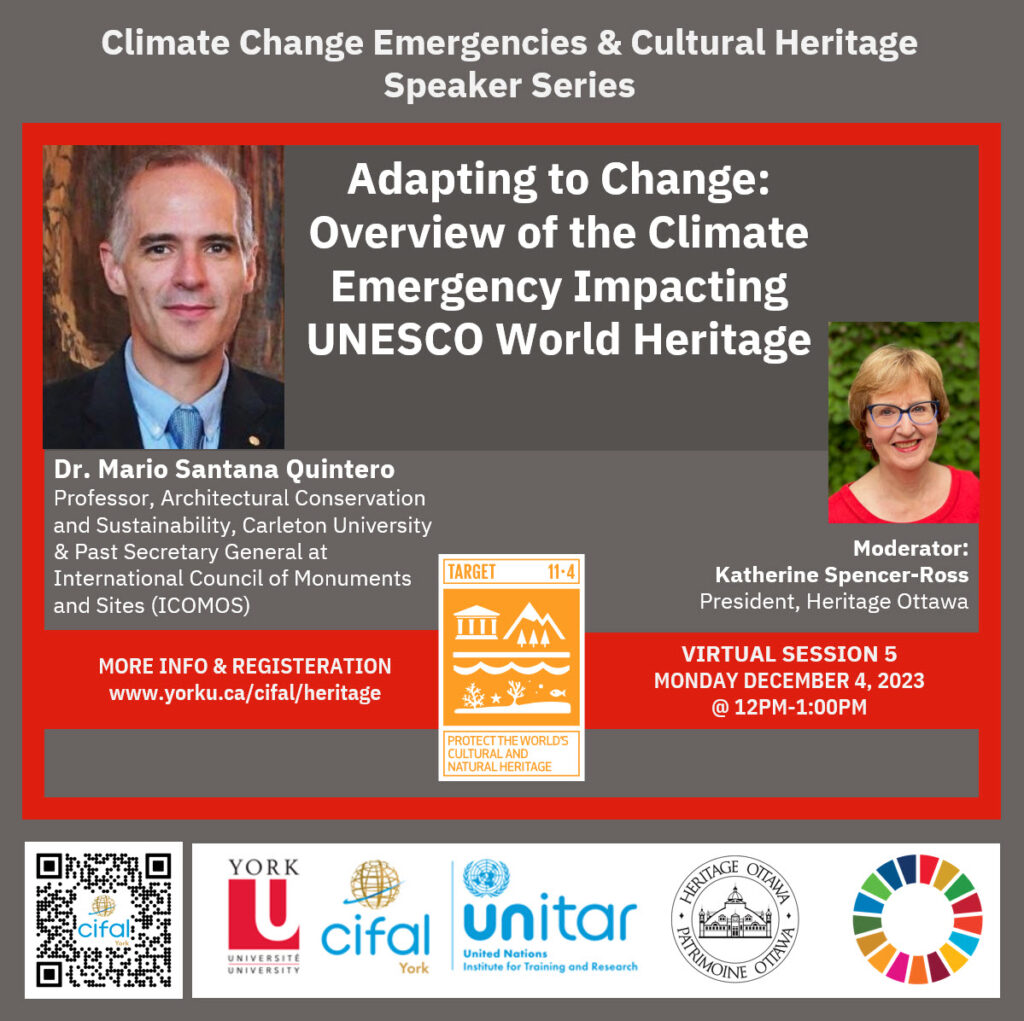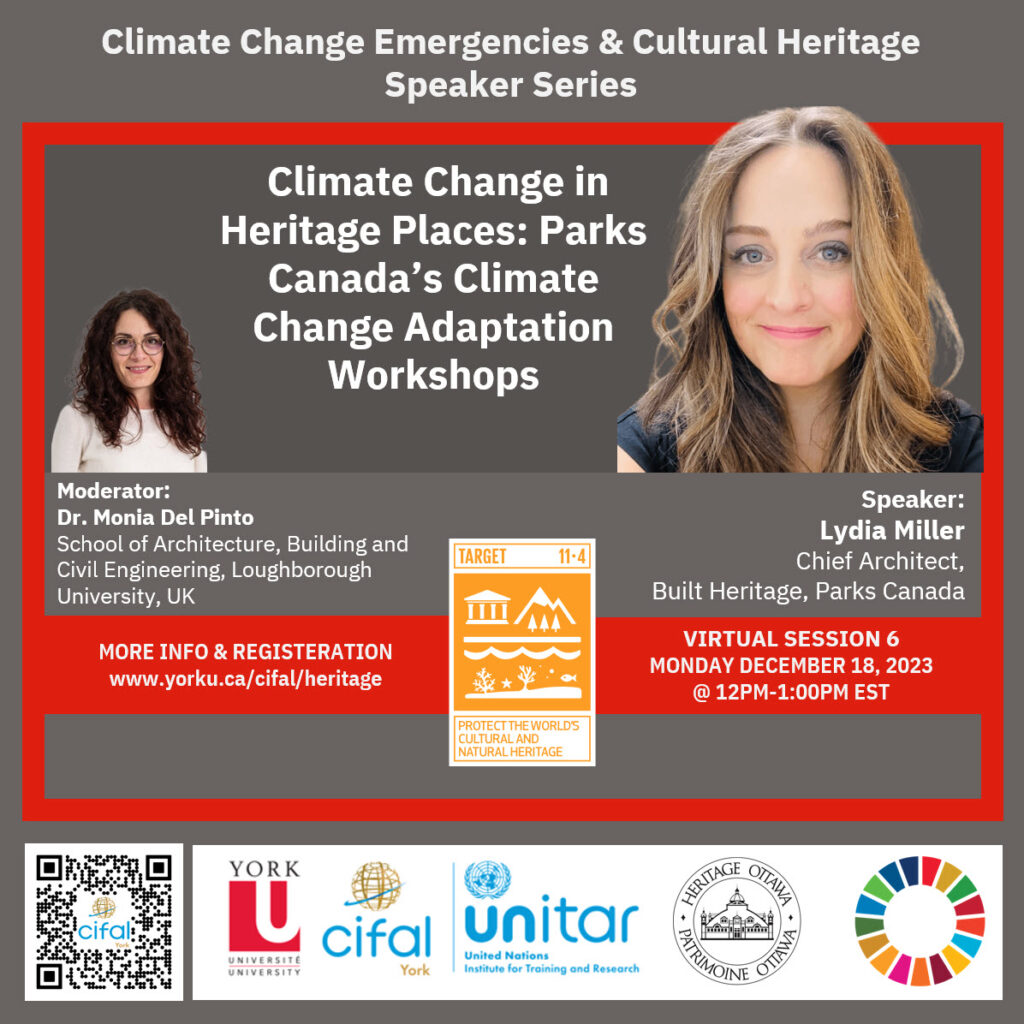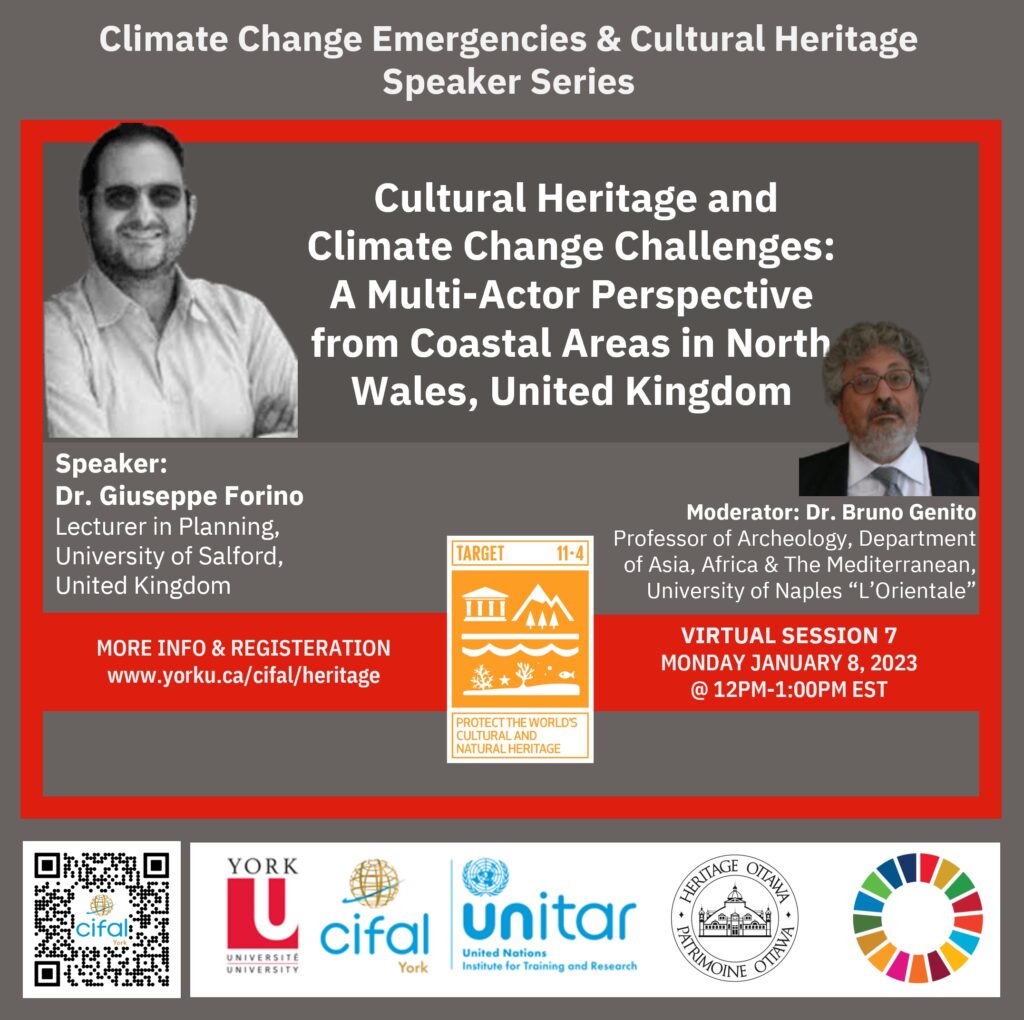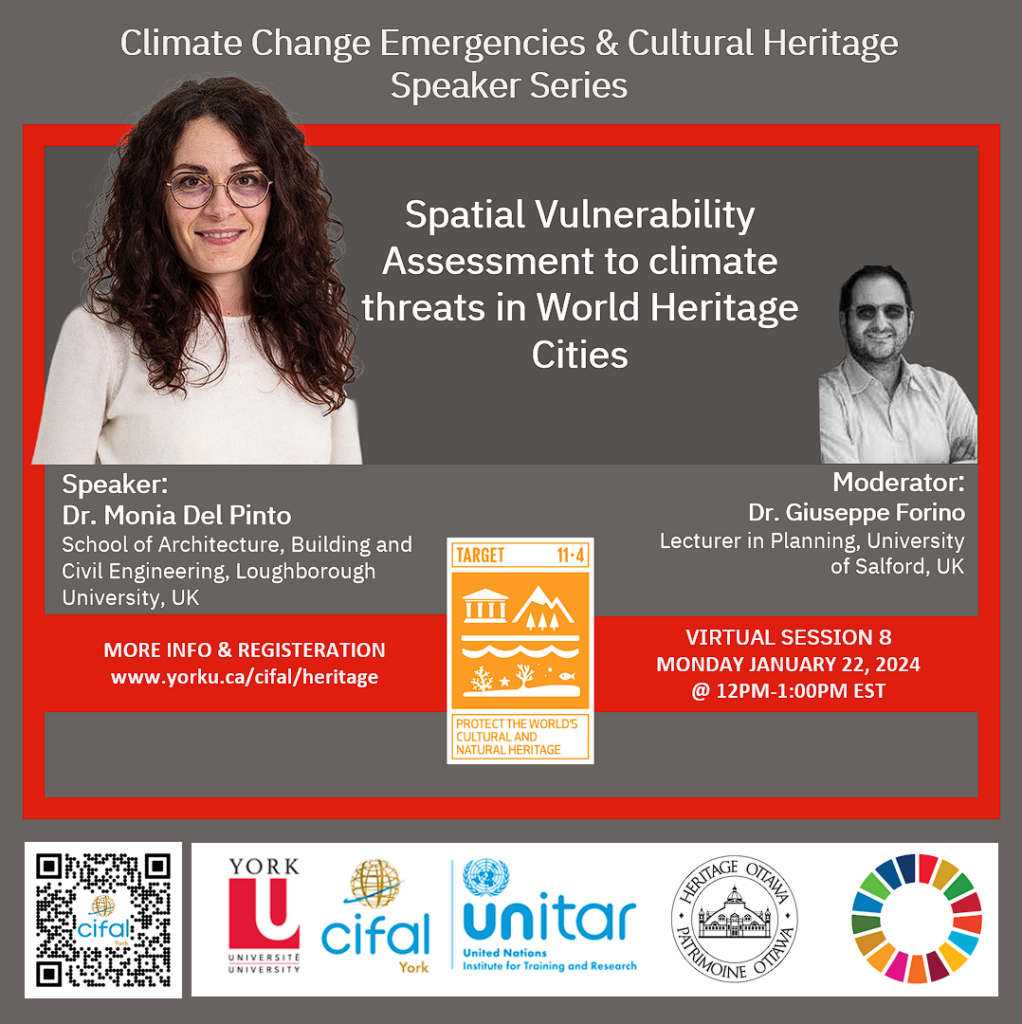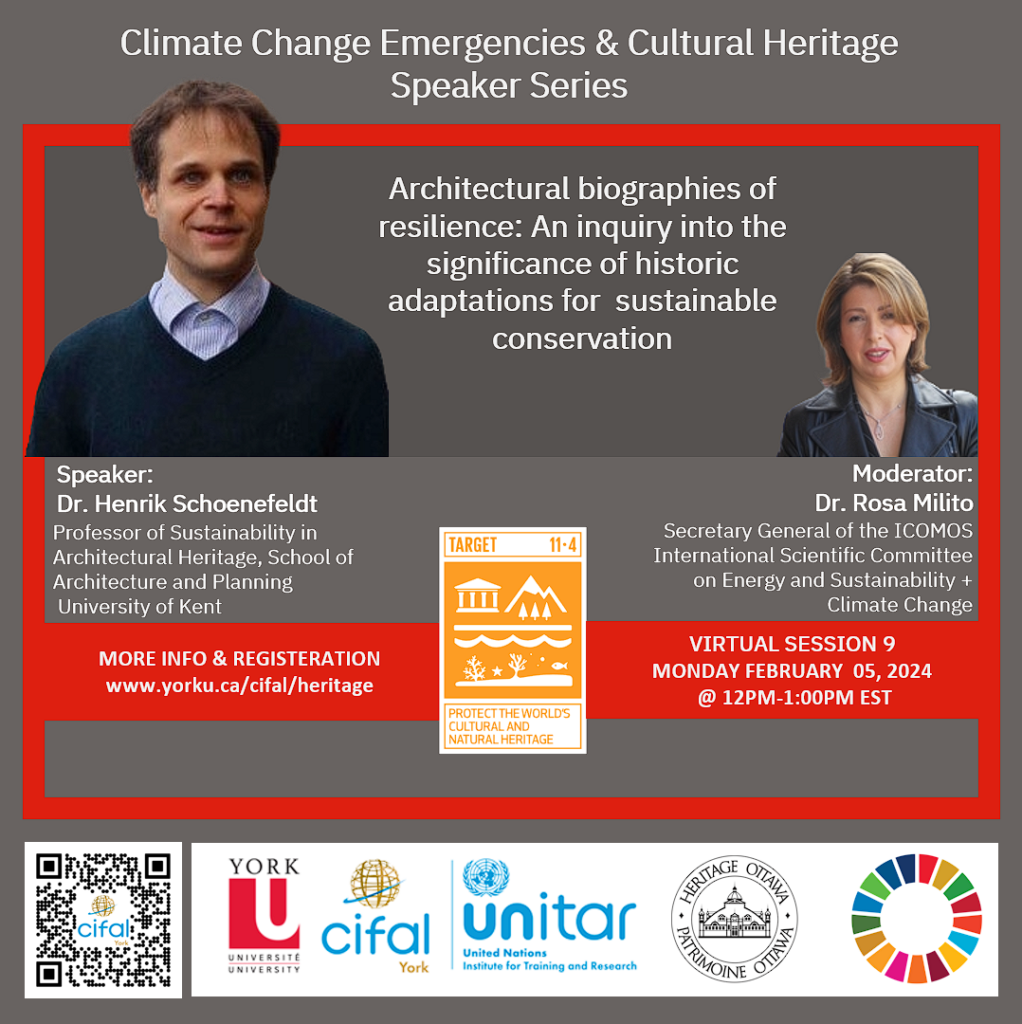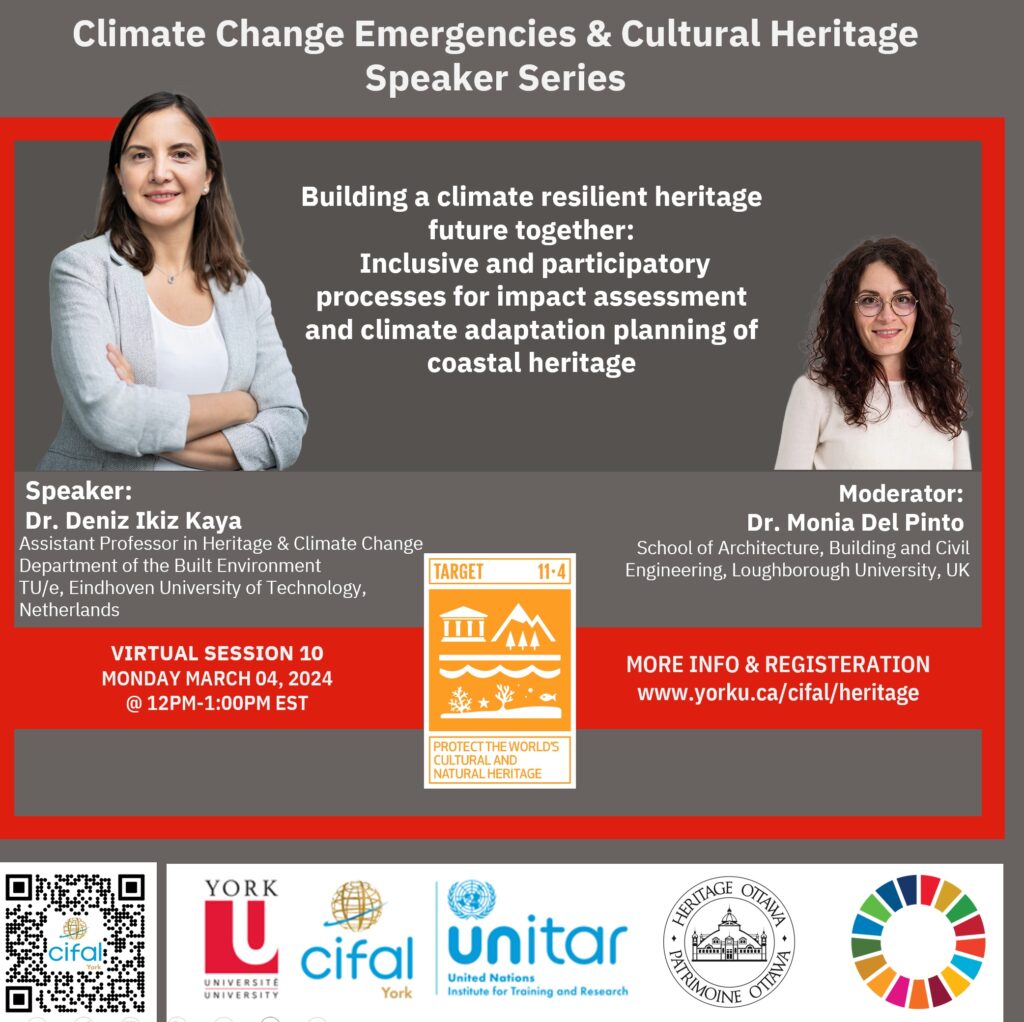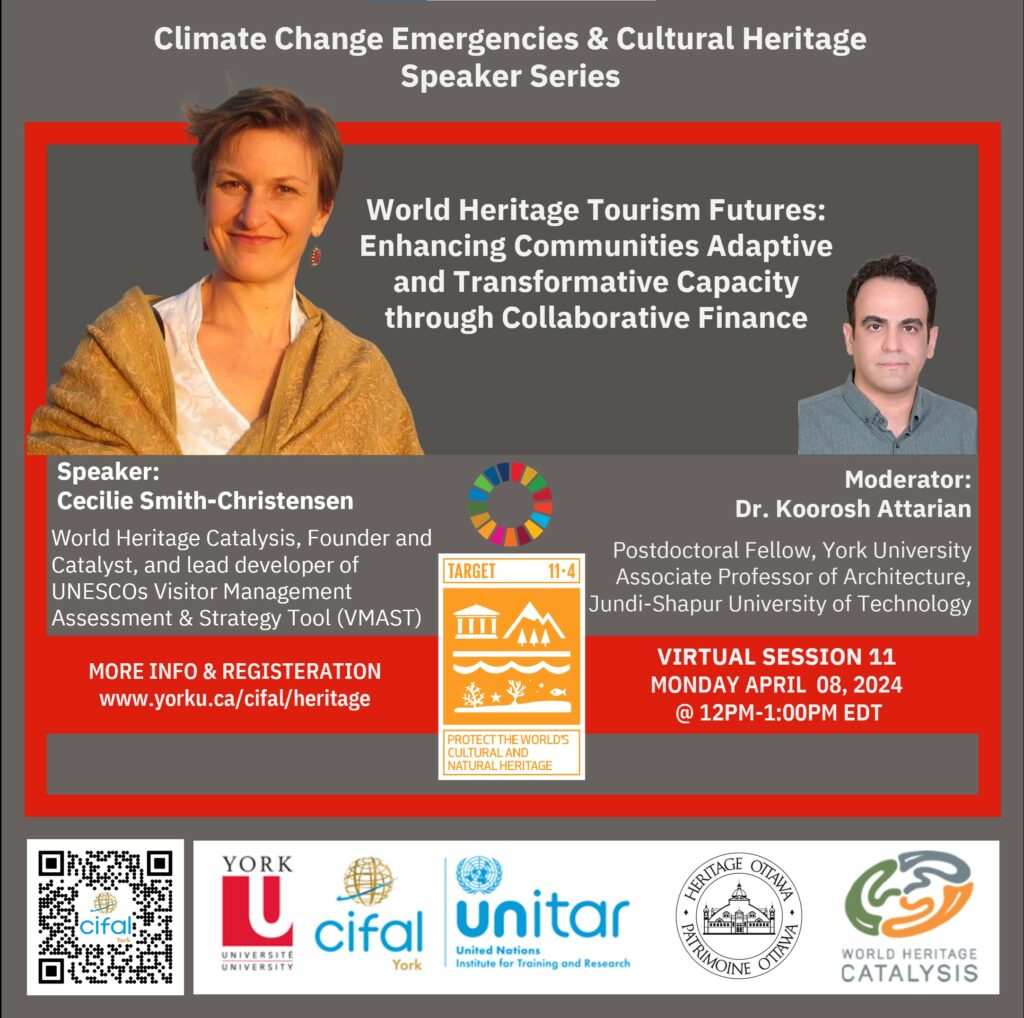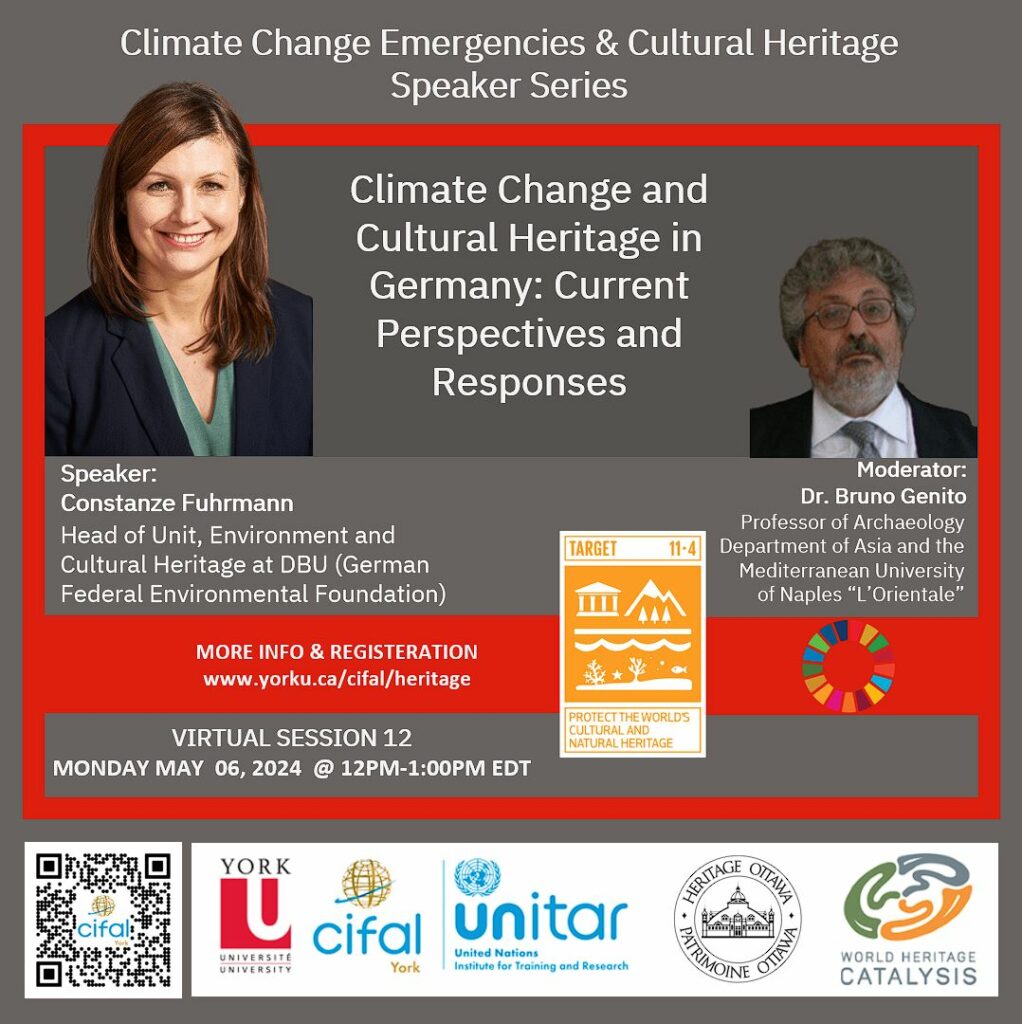
Dates, Times, Location
- 2023 Dates: September 25| October 9 | October 23 | November 6 | November 20 | December 4 | December 18
2024 Dates: January 8 | January 22 | February 5 | March 4 | April 8 | May 6 | June 3 | July 8| August 5| September 9 | October 7 | November 4 | December 2
2025 Dates: February 3 | March 7 | April 7 | June 2 | July 7 | September 8 - Time: 12:00 PM - 1:00 PM ET
- Location: VIRTUAL (ZOOM WEBINAR)
Register
Participants who attend a minimum of 50% of sessions will receive a certificate of attendance from CIFAL York
BACKGROUND
Climate change has established impacts and relationship with national and world heritage sites. Climate change is causing significant environmental changes where most heritage sites are situated. Climate change is also causing increase in frequency and intensity of extreme climate events. Emergency management (EM) is often taught in the context of community, provincial, national, and international emergencies. There is currently a gap in disaster and emergency management (DEM) education and training when it comes to cultural heritage as one of the most vulnerable environments and structures, particularly with respect to climate change impacts and emergencies. Emergencies affect historic sites differently and require unique approaches to EM efforts. Different plans and strategies have been implemented by UNESCO and other international and national agencies to conserve these valuable assets in their specific environmental conditions. This speaker series aims to address some of these topics through knowledge and experience sharing.
CIFAL York also aims to mobilize existing knowledge and capacities in climate change and cultural heritage and develop some training and education.
GOALS AND OBJECTIVES
The key goals and objectives of this speaker series are:
- To provide a platform for sharing knowledge and experiences related to climate change impacts on cultural heritage.
- To create a community of practitioners, researchers, and educators interested in climate change impacts on cultural heritage.
- To provide attendees with practical information and tools that they can use to examine the climate change impacts on cultural heritage.
- To understand how different agencies manage climate change impacts on cultural heritage.
- To foster collaboration and networking among attendees, speakers and stakeholders interested in climate change impacts on cultural heritage.
- To stay up-to-date with the latest research, developments and practices on climate change impacts on cultural heritage.
TARGET AUDIENCES
- Executives and leaders
- Cultural heritage professionals
- Cultural heritage managers and policymakers
- Graduate and undergraduate students
- Professors and researchers
VIRTUAL SESSION 1: SEPTEMBER 25, 2023 12:00-1:00PM EST
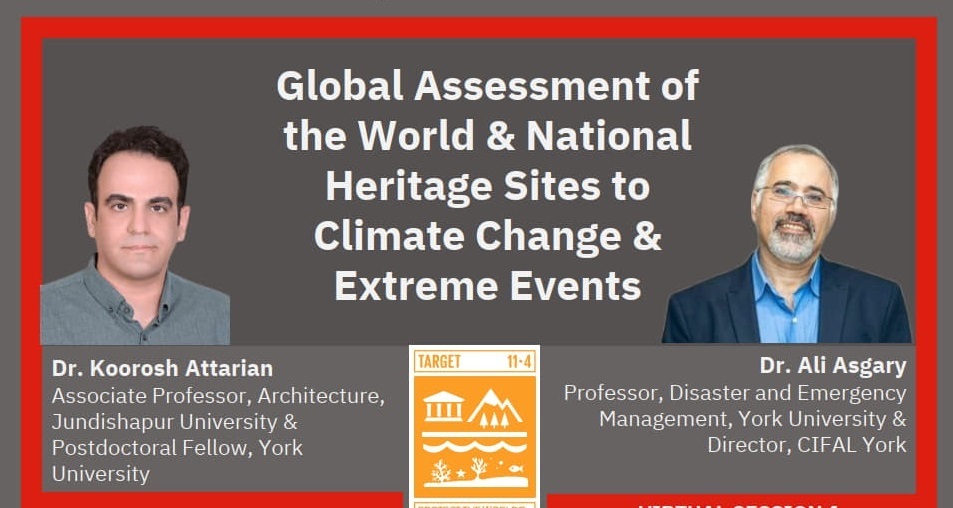
Recording of session 1
VIRTUAL SESSION 2: OCTOBER 23 2023, 12:00-1:00 PM EST
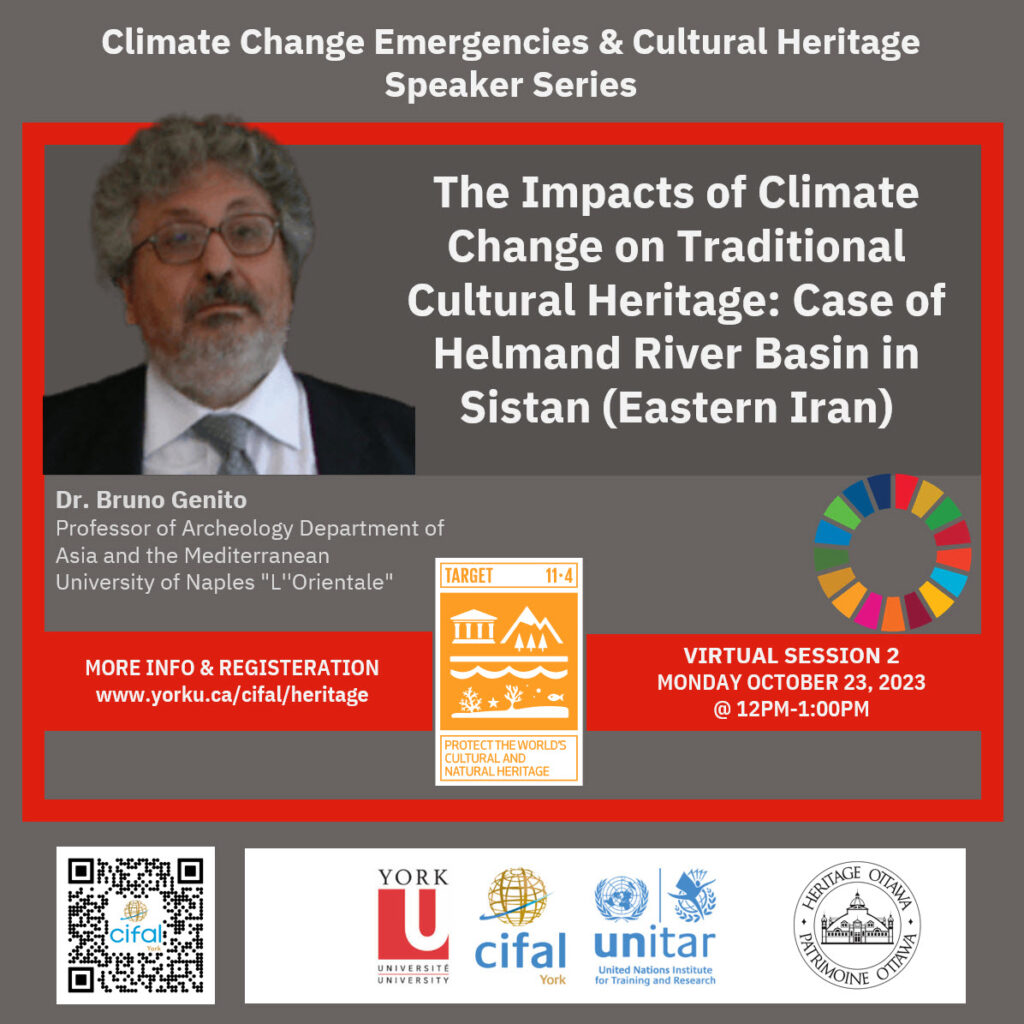
Speaker: Dr. Bruno Genito, Professor of Archeology, Department of Asia and the Mediterranean, University of Naples "L''Orientale"
Topic: The Impacts of Climate Change on Traditional Cultural Heritage: Case of Helmand River Basin in Sistan (Eastern Iran)
VIRTUAL SESSION 3 : NOVEMBER 6 12-1PM EST
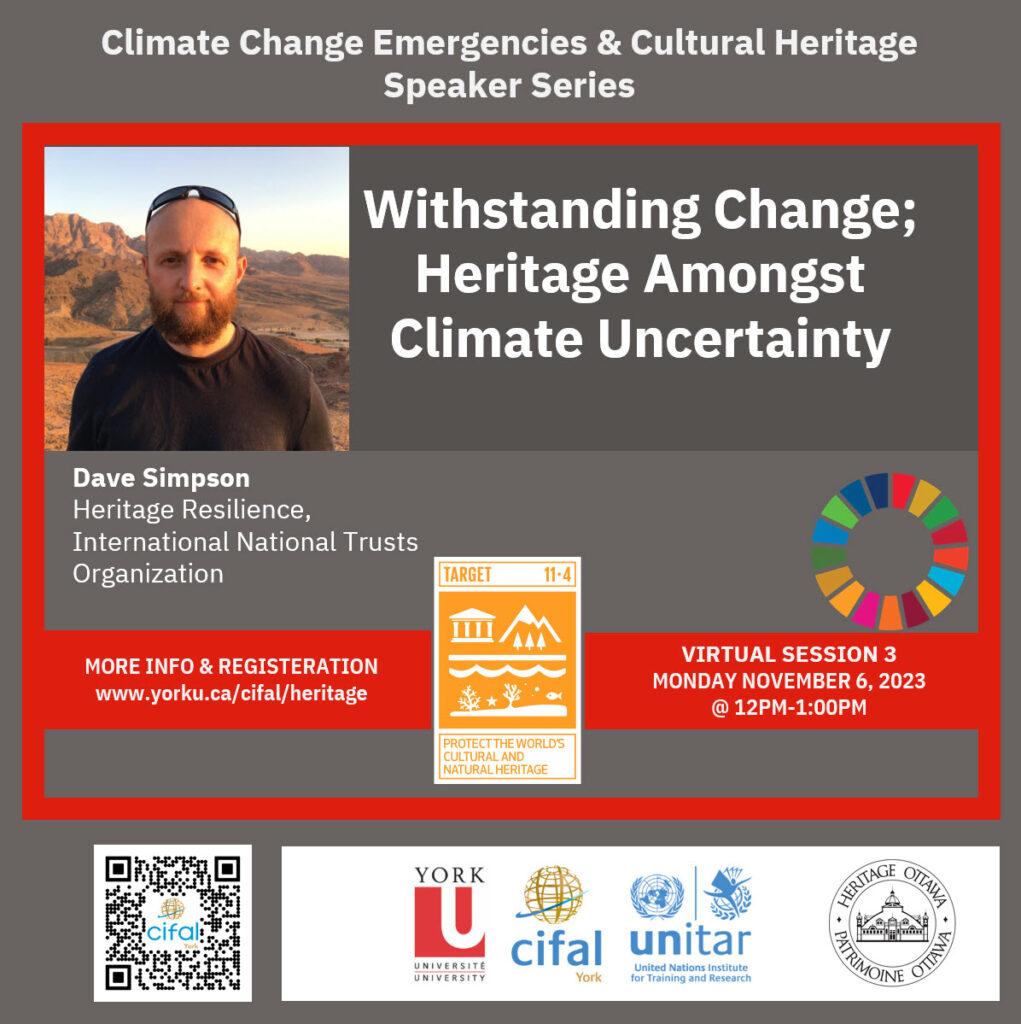
Speaker: Dave Simpson, Heritage Resilience, International National Trusts Organization
Topic: Withstanding Change; Heritage Amongst Climate Uncertainty
VIRTUAL SESSION 4 : NOVEMBER 20 12:00-1:00PM EST
Speaker: Dr. Rosa Milito Secretary General of the ICOMOS International Scientific Committee on Energy and Sustainability + Climate Change
Topic: Climate Action and Cultural Heritage connection: a synopsis of International efforts to strengthen the connection
VIRTUAL SESSION 5 : DECEMBER 4 12:00-1:00PM EST
Speaker: Dr. Mario Santana Quintero, Professor, Architectural Conservation and Sustainability, Carleton University
Topic: Adapting to Change: Overview of the Climate Emergency impacting UNESCO World Heritage
VIRTUAL SESSION 6 : DECEMBER 18 12:00-1:00PM EST
Speaker: Lydia Miller, Chief Architect, Built Heritage, Parks Canada
Topic: Climate Change in Heritage Places: Parks Canada’s Climate Change Adaptation Workshops
VIRTUAL SESSION 7 : January 8 12:00-1:00PM EST
Speaker: Giuseppe Forino, Lecturer in Planning, University of Salford, UK
Topic: Cultural Heritage and Climate Change Challenges: A Multi-Actor Perspective from Coastal Areas in North Wales, United Kingdom
VIRTUAL SESSION 8 : January 22 12:00-1:00PM EST
Speaker: Dr. Monia Del Pinto School of Architecture, Building and Civil Engineering, Loughborough University, UK
Topic: Spatial Vulnerability Assessment to Climate Threats in World Heritage Cities
VIRTUAL SESSION 9 : February 5, 12:00-1:00PM EST
Speaker: Dr. Henrik Schoenefeldt, Professor of Sustainability in Architectural Heritage, School of Architecture and Planning, University of Kent
Topic: Architectural biographies of resilience: An inquiry into the significance of historic adaptations for sustainable conservation
VIRTUAL SESSION 10 : March 4, 12:00-1:00PM EST
Speaker: Dr. Deniz Ikiz Kaya, Assistant Professor in Heritage & Climate Change, TU/e, Eindhoven University of Technology, Netherlands
Topic: Building a climate resilient heritage future together: Inclusive and participatory processes for impact assessment and climate adaptation planning of coastal heritage
VIRTUAL SESSION 11 : April 8, 12:00-1:00PM EDT
Speaker: Cecilie Smith-Christensen, World Heritage Catalysis, Founder and Catalyst, and Lead Developer of UNESCOs Visitor Management Assessment & Strategy Tool (VMAST)
Topic: World Heritage Tourism Futures: Enhancing Communities Adaptive and Transformative Capacity through Collaborative Finance
VIRTUAL SESSION 12: May 6, 12:00-1:00PM EDT
Speaker: Constanze Fuhrmann, Head of Unit, Environment and Cultural Heritage at DBU (German Federal Environmental Foundation) Board
Topic: Climate Change and Cultural Heritage in Germany: Current Perspectives and Responses
VIRTUAL SESSION 13: June 3, 12:00-1:00PM EDT
Speaker: Fergus Maclaren, B.A., M.E.Des. President, ICOMOS International Cultural Tourism Committee
Topic: Destination resilience challenges facing African World Heritage sites: Applying Climate Change Mitigation and Adaptation approaches to Tourism Planning and Management
VIRTUAL SESSION 14: July 8, 12:00-1:00PM EDT
Speaker: Antonio Gómez-Palacio. Chair and Founding Partner of DIALOG
Topic: It's About People: Anchoring the Stewardship of Land and History in a Vision for the Future
VIRTUAL SESSION 15: September 9, 12:00-1:00PM EDT
Speaker: Dr. Linda Shetabi, Faculty and Director of the MSc Conservation Programme at the Division of Landscape Architecture at the University of Hong Kong.
Topic: Inconsistency of national and international policy with sustainable development and heritage conservation
VIRTUAL SESSION 16: October 7, 12:00-1:00PM EDT
Speaker: Dr. Mike O’Rourke, PhD, Climate Change Archaeologist - Government of the Northwest Territories - Culture & Heritage Division.
Topic: "It’s not so much about what we do, as it is about how we do it"- Management Responses to Climate Change Impacts on Archaeological Sites in the Northwest Territories, Canada.
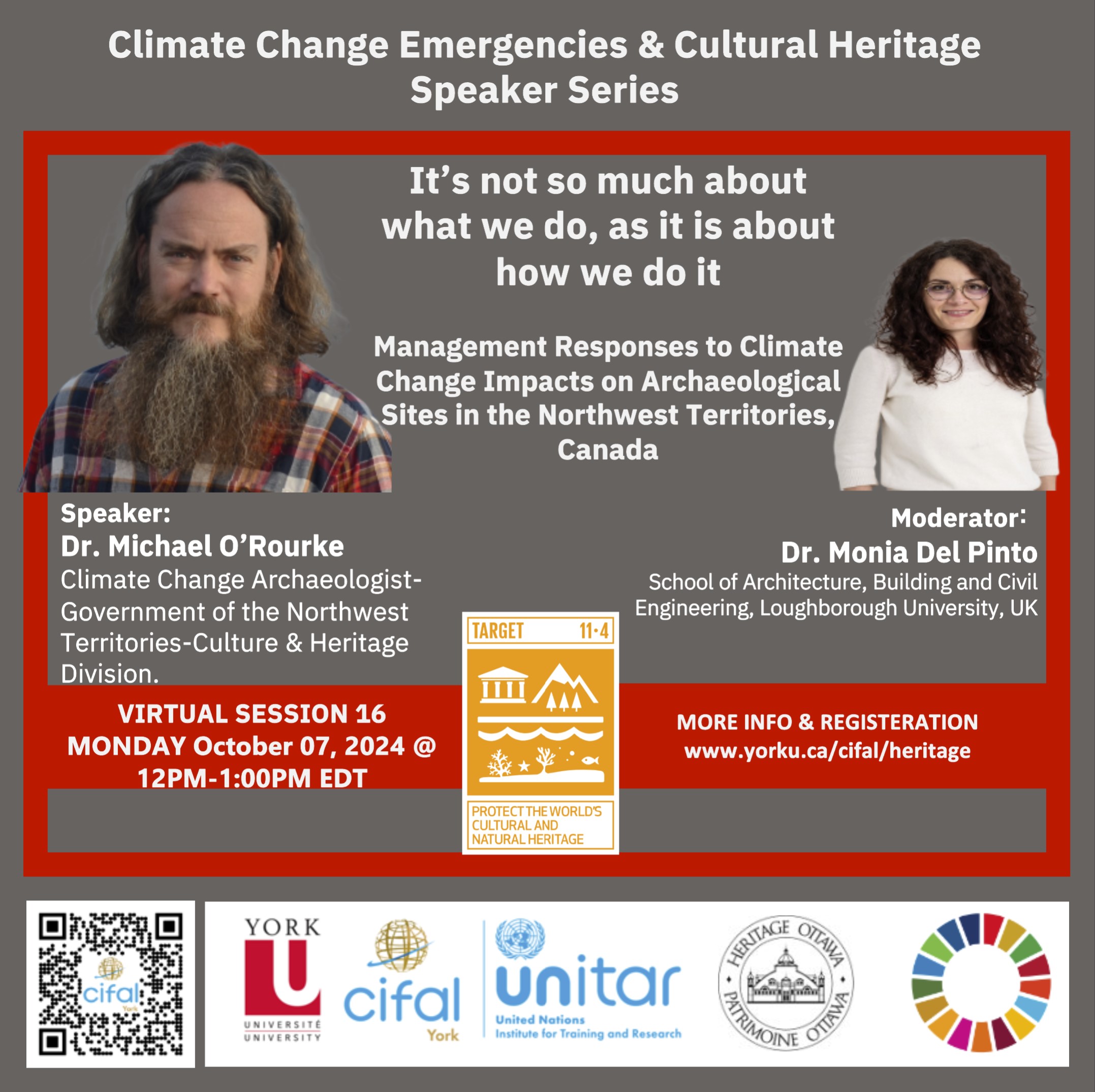
VIRTUAL SESSION 17 November 4, 12:00-1:00PM EDT
Speakers: Dr. Angela Lombardi, Associate Professor, Architecture – Historic Preservation, University of Texas San Antonio, and
Dr. Saadet Toker-Beeson, Associate Dean for Community Engagement, Interim Director of the School of Architecture+Planning, University of Texas San Antonio
Topic: Enhancing Disaster Resilience on the Texas Gulf Coast: A framework for Historic Places of Worship and their Communities
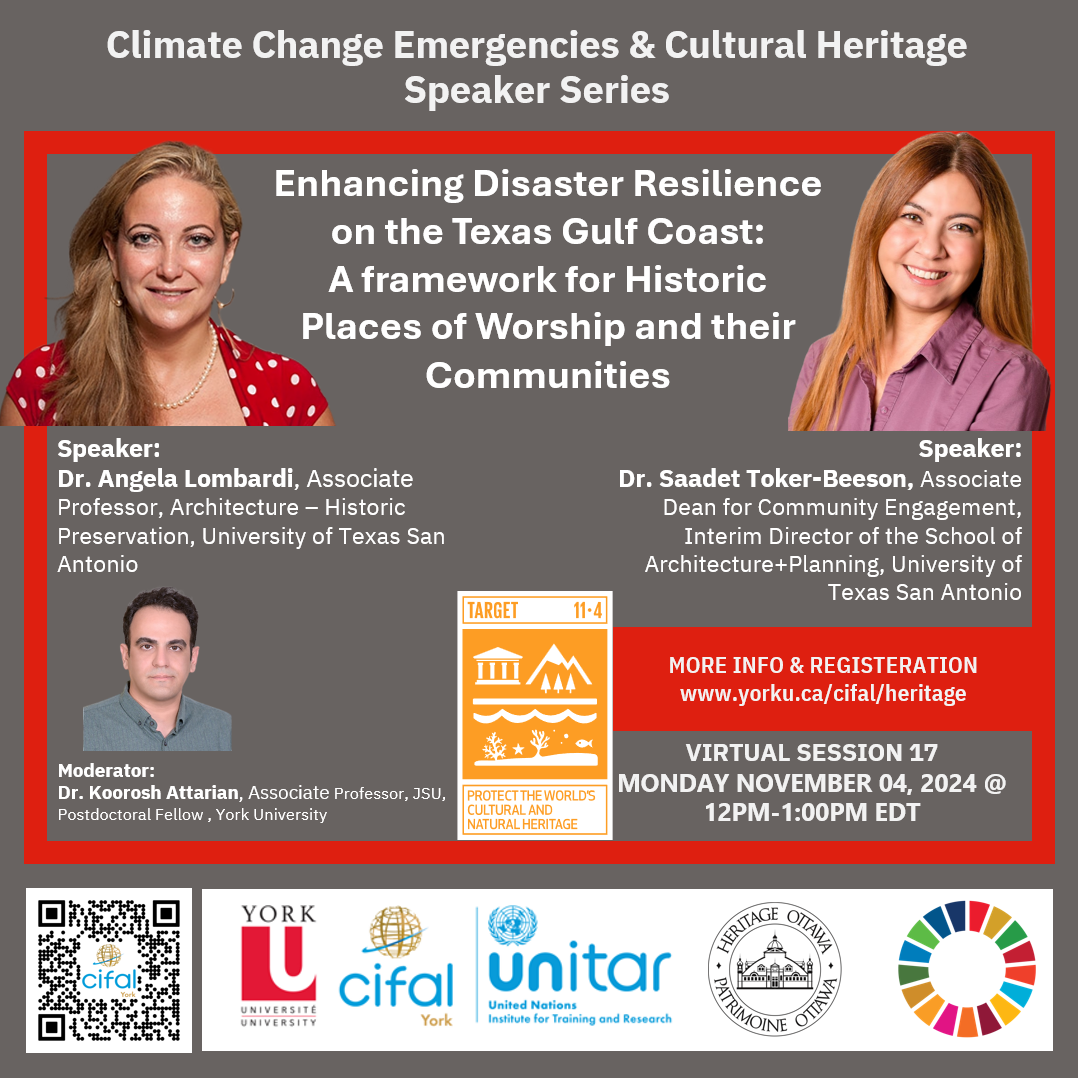
VIRTUAL SESSION 18 December 2, 12:00-1:00PM EDT
Speaker: Candice Bogdanski Ph.D. (ABD), Senior Heritage PlannerSenior Heritage Planner, Town of Niagara-on-the-Lake
Topic: Localizing Global Imperatives: Cultural Heritage and Climate Change at the Municipal Level
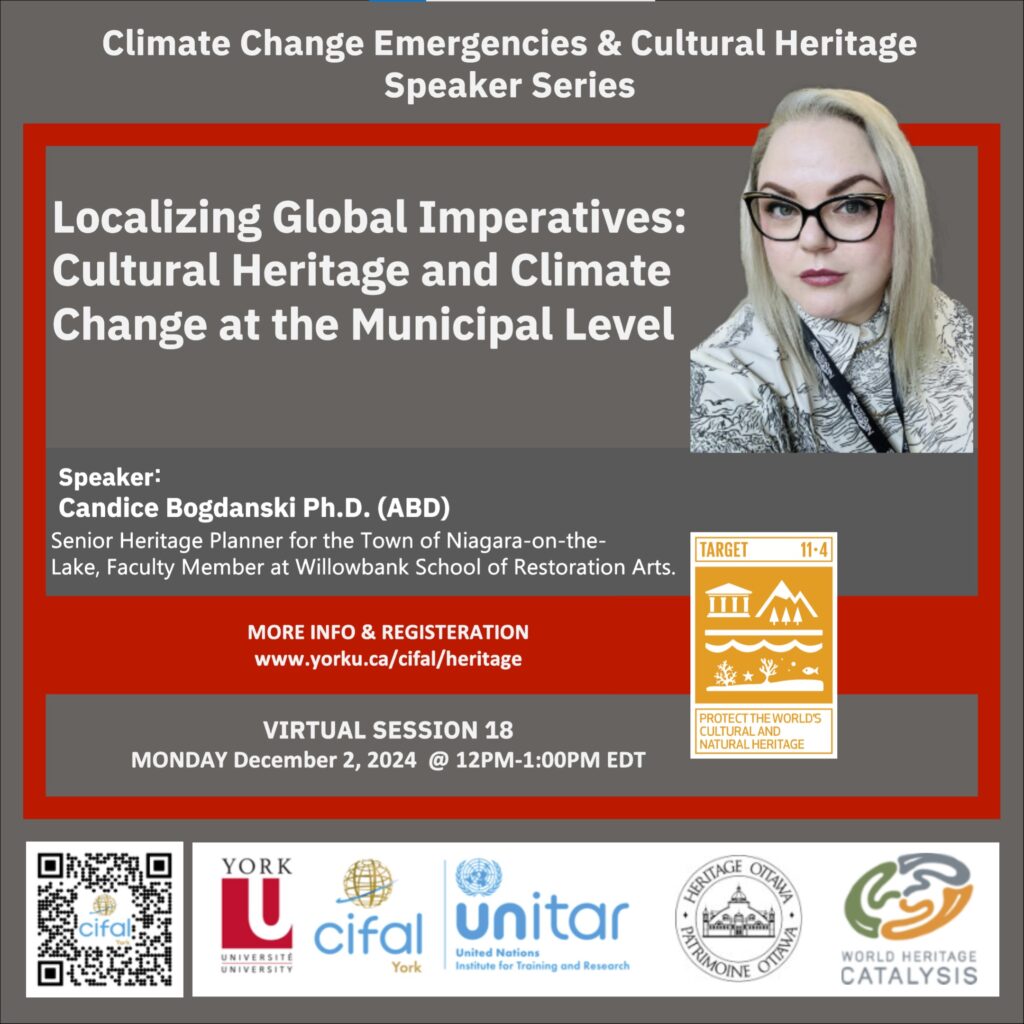
VIRTUAL SESSION 19 February 3, 12:00-1:00PM EDT
Speaker: Marcus R. Létourneau, PhD, MCIP, RPP, CAHP, CIPM, President M. R. Letourneau and Associates Inc.
Topic: ‘The more things change, the more they stay the same’: Reflections on the integration of climate change considerations and risk management into Ontario’s Heritage Policy Framework
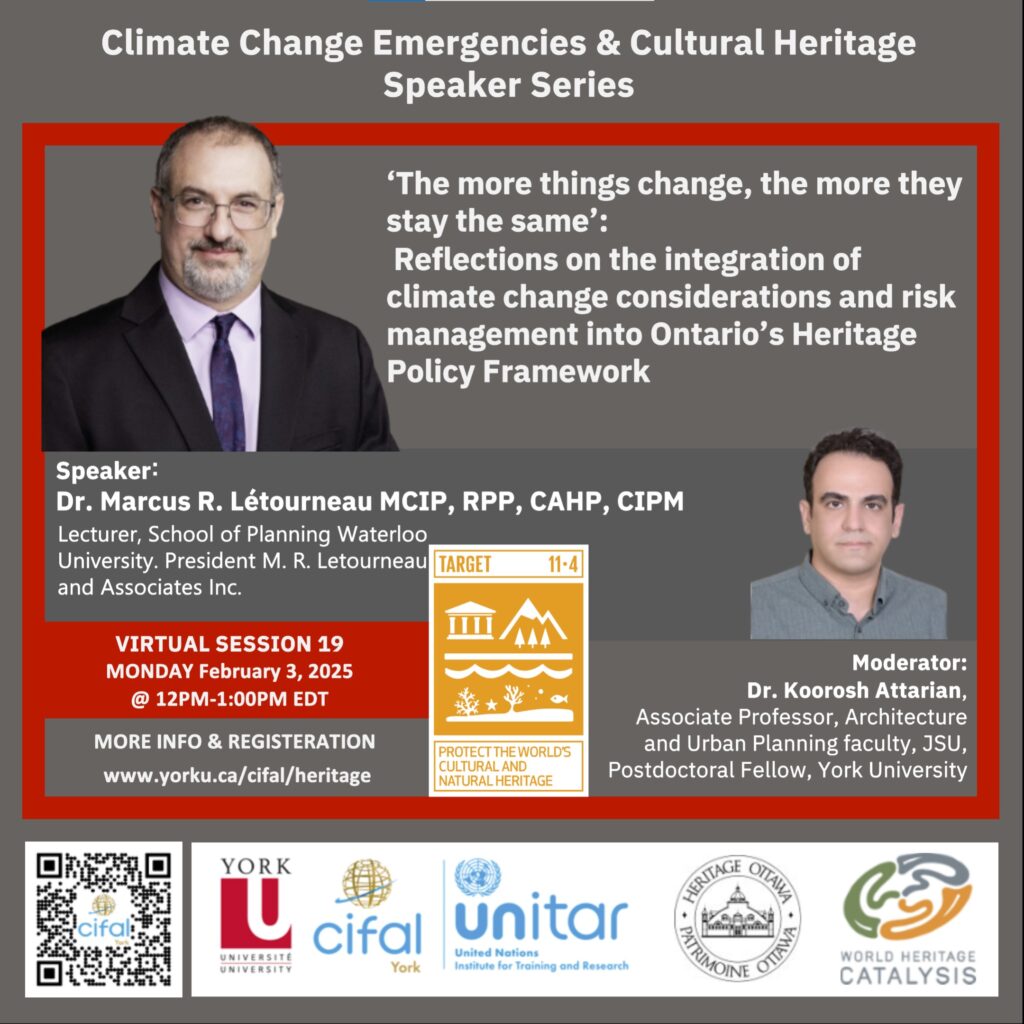
VIRTUAL SESSION 20 April 7, 12:00-1:00PM EDT
Speaker: Dr. Matthias Ripp, Senior Heritage Manager, Regenstauf, Bavaria, Germany
Topic: Urban Heritage Resilience: An Integrated and Operationable Definition from the SHELTER and ARCH Projects
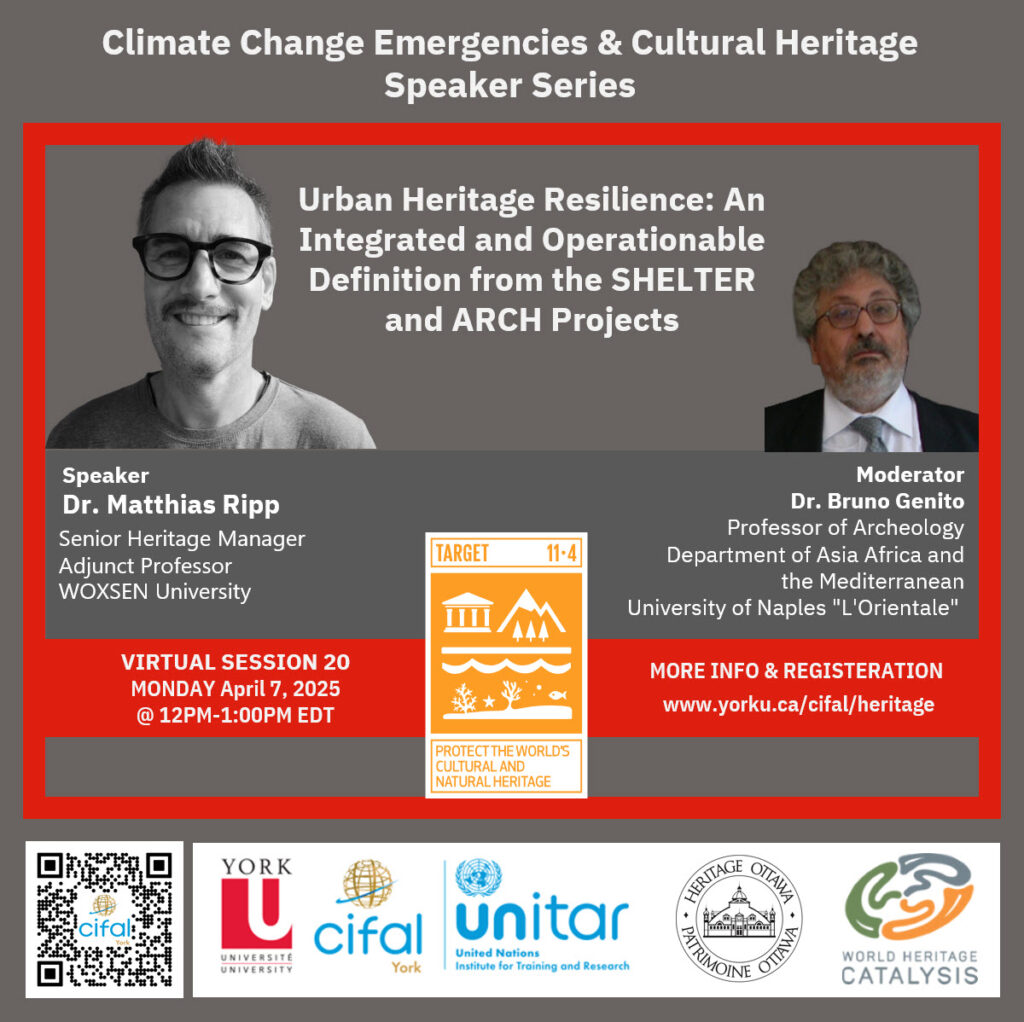
VIRTUAL SESSION 21 May 5, 12:00-1:00PM EDT
Speakers: Carlos Morell, MS Conservation, CAHP, Principal at GBCA (Goldsmith Borgal & Company Ltd. Architects)
Eric Charron, Architect, OAA, CAHP at Diamond and Schmitt Architects (DSAI)

VIRTUAL SESSION 22 June 2, 12:00-1:00PM EDT
Speaker: Dr. Jonathan S. Bell, Vice President, World Monuments Fund
Topic: World Monuments Fund Climate Heritage Initiative: three pillars for climate adaptation at cultural heritage places

VIRTUAL SESSION 23 July 7, 12:00-1:00PM EDT
Speakers: Alireza Farrokhi, Manager, Heritage Places Conservation Division & Evan Oxland, Built Heritage Advisor, Parks Canada
Topic: Disaster Risk Management at Canadian Heritage Places

VIRTUAL SESSION 24 September 8, 12:00-1:00PM EDT
Speaker: Mitchell May, OAA, CAHP, CPHD - Associate at Giaimo + Associates Architects
Title: From Policy to Parapets: Scales of Heritage and Climate Adaptation

Organizer & Partners

Organizer
CIFAL York is part of UNITAR's global network of training centres for knowledge-sharing, training, and capacity-building for public and private leaders, local authorities, and civil society. CIFAL Centres are local and regional hubs for innovative, participatory and co-creative knowledge exchange opportunities to support decision-making processes, build capacity, and accelerate the implementation of Sustainable Development Goals. Established in 2020, CIFAL York started its operation in June 2021 as the first CIFAL Centre in Canada. Health and Development training and knowledge sharing is among the key focusing areas of CIFAL York.
For more information or questions, please contact: cifaldirector@yorku.ca
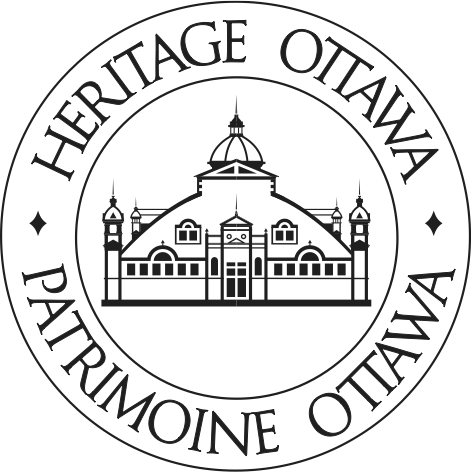
Partner
Heritage Ottawa envisions a city that values its heritage resources, integrates them into all planning decisions and ensures their contribution to Ottawa's livability. They see a future where investment in the conservation of heritage buildings, historic neighbourhoods, cultural landscapes, and other places that matter to communities is embraced as the smart cultural and sustainable choice for the city. Heritage Ottawa advocates for the protection and enhancement of Ottawa's distinctive built heritage and cultural landscapes. They speak out for and defend worthy heritage properties that are at risk of inappropriate intervention or loss. The Aberdeen Pavilion, the Billings Estate, the East Block of the Parliament Buildings, the Château Laurier, and the Central Experimental Farm are just some of the properties that have benefited from Heritage Ottawa's advocacy efforts. Heritage Ottawa Promotes the awareness, understanding, and appreciation of Ottawa's wonderful built heritage and distinctive cultural places.
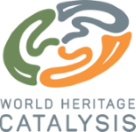
Partner
World Heritage, recognized through the UNESCO World Heritage Convention (1972), are natural and cultural heritage considered of "Outstanding Universal Value" to humanity. As such they represent our shared heritage and responsibility to preserve, conserve and protect.
In response World Heritage Catalysis seeks to address root causes of problems rather than symptoms and develop a theory of change including appropriate interventions allowing all World Heritage stakeholders an opportunity to engage with and benefit from World Heritage, and collaboratively address and achieve lasting improvements of societal issues.

